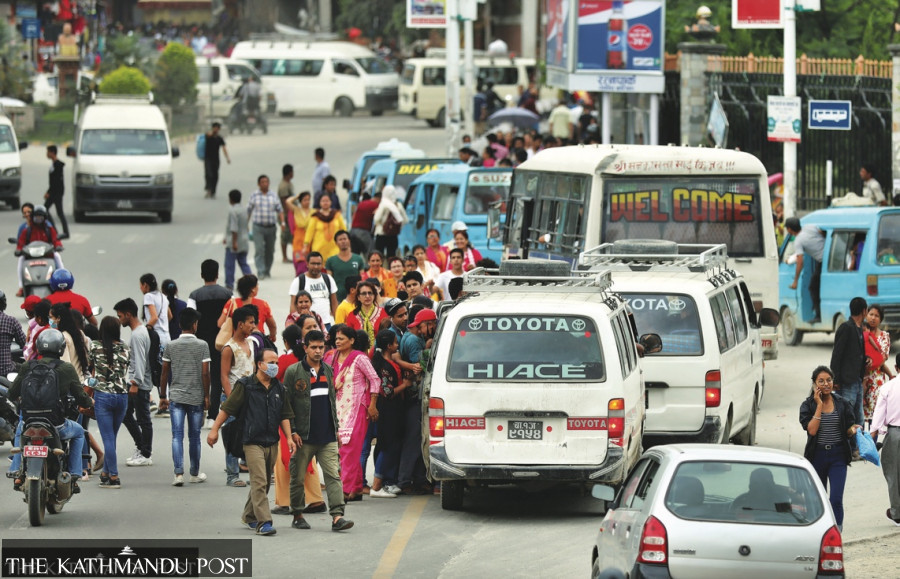Valley
Bagmati Province’s reduction in bus fares has not been implemented, commuters complain
The Bagmati provincial Ministry of Labour, Employment and Transport slashed bus fares last week.
Anup Ojha
The Bagmati Province government announced a reduction in the public bus fares effective last Thursday but regular commuters using public vehicles in the Kathmandu Valley still complain of being overcharged. The government has done nothing to enforce its own new rules, they say.
After a recent reduction in petroleum product prices, the Bagmati provincial Ministry of Labour, Employment and Transport dropped bus fares last week. The ministry included the new bus fare list in the provincial gazette which states that starting May 25, all public vehicle operators should apply the revised bus fares. However, the public vehicles plying in the Kathmandu Valley have not reduced the bus fares, many commuters the Post talked to said.
A week before that, the Department of Transport Management had reduced the fares for public vehicles and cargo carriers operating on long routes, following a decrease in diesel prices. The department said the rates were revised according to the ‘auto pricing mechanism’ and that it had come into effect immediately.
Based on the Provincial government’s latest revised rates, the bus fares have now been reduced to Rs19 from Rs20 for 0–5 km distance. The fare for 0–10 km has been reduced from Rs27 to Rs25; for 0–15 km, it has been reduced from Rs32 to Rs30; for 0-20 km from Rs35 to Rs33; and above 20 km, it has been reduced from Rs40 and Rs38.
“But the public vehicle operators have not reduced the bus fare on our route,” said Sandhya Pokharel, a student of Shankar Dev Campus who regularly commutes from her home in Sitapaila to Putalisadak.
She said that every day, she has been paying Rs30 as bus fare, even though the distance between her home and college is less than 10 km. Based on the ministry's revised rule, the fare should be Rs25.
“I need to board a microbus everyday,” said Pokharel, 21, a third year Bachelors of Business Administration student. “It’s outside the Ring Road, and if we raise questions, they won’t allow us to board the vehicle.”
She said that she spends Rs60 daily on her bus fare. “I am a full-time student, and solely depend on my parents for the bus fare and my tiffin,” she said.
Similarly, Sandesh Paudel, 41, a secondary level teacher who boards a bus daily from Lokanthali to Sahidgate, said the bus operators are not reducing the fares.
There has not been a reduction in the bus fare, and he has been paying Rs25 everyday.
Paudel asked the conductor to reduce the bus fare but the conductor said the committee has not reduced the fare, Paudel said.
Pokharel and Paudel are just representative cases. Many other commuters in public vehicles say besides not reducing the bus fares, most of the conductors decline returning loose change to the commuters, citing a shortage of money.
Officials at the Kathmandu Valley Traffic Police Office said they have not received any complaints from the public yet about bus operators not complying with the revised list of transport fares.
“Traffic police have been regularly inspecting for traffic rules violations and overcharging vehicles,” said Rajendra Prasad Bhatta, spokesperson for the traffic police office. “We have not received any complaints so far.”
Consumer rights activists, however, blame the state apparatus for not being responsible toward the citizens.
Madhav Timalsina, president of the Consumer Rights Investigation Forum, said the provincial ministry and even the department of transport management are working in favour of the public transport operators.
“The fare adjustment itself is not scientific,” Timalsina said. “Because the conductors are overcharging passengers everywhere with the excuse that they don’t have the change. Why can’t they make digital payments compulsory?”
“The government should take strong actions against such acts,” Timalsina added.
Khagendra Paudel, information officer at the provincial transport ministry, said the ministry will soon coordinate with Valley traffic police and the Department of Transport Management to implement the reduced bus fares. “We are aware of the problem now,” he said. “We will soon coordinate with all the stakeholders for better surveillance and strict enforcement of the new fare.”
The ministry, however, doesn’t have any plan to make digital payment mandatory, he said.




 8.69°C Kathmandu
8.69°C Kathmandu.jpg)













